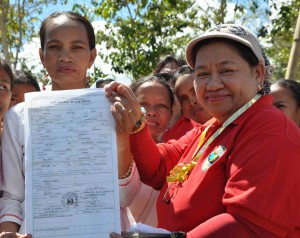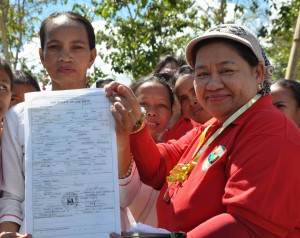By JOSEPH HOLANDES UBALDE
Interaksyon.com
IT may have been a 38-year wait for Marina Verma, but for her it was worth it. For the first time since she was born, the proud Teduray tribe woman from Maguindanao finally held in her hands the certificate of her birth.
For Verma, this is the beginning of a new chapter in her life. Like the majority of the Teduray tribe, she was born in Maguindanao but had to move to Sultan Kudarat in 1997 following the conflicts in the province.
“This is the first time in my life to have a real identification,” she said.
Born in one of the poorest regions in the Philippines, Verma wanted to give a better life to her seven children. But she is often denied a job, almost rejected admission to school and has been asked countless of time to prove her identity.
Now, Verma is the first recipient of the United Nations High Commission for Refugees-funded program that aims to provide, before the year ends, some 60,000 free birth certificates to people in Mindanao including indigenous people affected by decades-long conflict in the area. The UNHCR began the program last month.
In South Upi, where Verma received her birth certificate, the international agency aims to help 3,500 people get their birth certificates. According to the National Commission for Culture and the Arts, the Tedurai population is estimated to be at 67,745.
Bernard Kerblat, UNHCR’s representative in the Philippines, stressed the importance of having a birth certificate among marginalized communities to assert their rights.
“It also prevents them from becoming stateless. That is why this is a critical initiative for all of us,” he said.
Government agencies like the Department of Social Work and Development, Civil Registrar’s Office and the Office of the Southern Cultural Communities (OSCC) also helped out in the project. The OSCC is also part of the team that registered traditional marriages.
In the Philippines, a birth certificate is perhaps the most important document about one’s identity. This is the basic requirement for all other Ids provided by the government. In Metro Manila, a copy of the birth certificate usually costs between 150 to 500 pesos depending on whether it was secured personally or delivered by mail.
Verma plans to use the birth certificate to get a new lease on her life.
“I now feel a connection with the government. Back then, everything felt uncertain,” she said.

